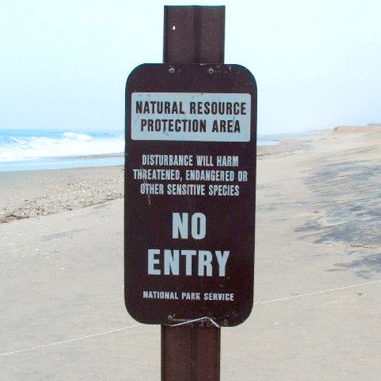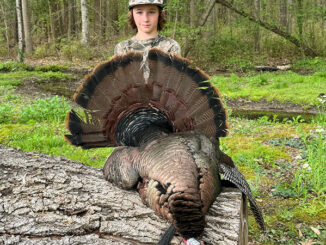
Gordon Myers, newly-appointed executive director of the N.C. Wildlife Resources Commission, encountered his first controversy after less than a month in his new position and the brouhaha involved recent restrictions of public beach access at Cape Hatteras National Seashore.
Apparently a 30-member federally-authorized Negotiated Rulemaking Committee was asked Sept. 9 by one of its members, Warren Judge, a Dare County commissioner, to allow Dare County public television to broadcast future Neg-Reg meetings.
But three representatives from bird- and turtle-protection groups (Audubon Society, Defenders of Wildlife, and Southern Environmental Law Center), along with a local bird-watching group’s president, voted against public broadcasts. Then a regional WRC supervising coastal diversity biologist, David Allen, also voted to keep the meetings untelevised.
Allen’s vote actually didn’t mean anything as far as denial of the proposal because committee rules, according to Mike Murray, NPS superintendent, required a unanimous vote to allow TV cameras in the committee room. The actual vote was 25-5 for the proposal, but the first no vote axed the request.
However, observers were outraged a public agency such as the WRC would have its representative vote to deny public access via television to the committee’s discussions.
The committee is supposed to be working out permanent rules for off-road vehicle and pedestrian access to sections of the CAHA used as nesting regions by threatened birds and sea turtles. A lawsuit filed by SELC on behalf of Audubon and DOW last spring resulted in huge stretches of popular fishing beaches being closed to pedestrian and ORV access.
After learning of Allen’s vote, Recreational Fishing Alliance executive director Jim Donofrio said: “The state of North Carolina has a statute that allows public broadcast of all public meetings and for a representative of the State of North Carolina to deny the public the ability to watch the full committee meetings and make their own judgments of this public process is an outrage. I guess we know what side the N.C. Wildlife Resources Commission is on.”
The WRC responded by issuing a Sept. 16 statement: “The N.C. Wildlife Resources Commission supports opening negotiated rulemaking (Reg-Neg) committee meetings to a broader segment of the public through cable television and Internet broadcasts.”
In the same news release, Myers agreed with Donofrio and disavowed Allen’s vote.
““Science-based decision making is fundamental to sound resource management, but those decisions must also take into account culture, tradition, economic impacts and public trust rights,” Myers said. “The Reg-Neg committee is composed of a broad set of interest groups affected by the ORV regulations. Synthesis of all perspectives and strict adherence to the meeting ground rules will result in the most sustainable long-term policy. Implementation of broadcast technology would provide another option for the public to overcome geographic separation in order to stay informed and participate in the rule-making process.”
Some committee members said prior to the vote they were concerned a public broadcast would create a “carnival atmosphere” and change behaviors of committee members.
Patrick Paquette, who serves the Recreational Fishing Alliance Shore Access Program and the United Mobile Sport Fishermen, supported the request for televised meetings.
Paquette noted at an earlier committee meeting a crew from French Television, filming a documentary on global warming, had been allowed to film part of a meeting.
The five members who opposed the broadcast included Jason Rylander (Defenders of Wildlife), Walker Golder (N.C. Audubon), and Derb Carter (Southern Environmental Law Center) — the plaintiffs whose lawsuit helped create a controversial consent decree that resulted in beach closures and may create more this fall.
The fourth member to object to the broadcast was Neal Moore of the Cape Hatteras Bird Club. Neal did not stay in the meeting room to listen to public comments at the Sept. 9 meeting, according to an RFA news release.
Allen’s vote was characterized as “an insult to the hundreds of thousands of out-of-state recreational fishers that travel to and utilize this precious national resource and sustain the local economy during the fishing season” by Billy Lomniki, President of the United Mobile Sportfishermen.
“The recent news release was intended to clarify our policy that we are committed to open and accessible meetings,” Myers said. “David (Allen) made a difficult decision that was based on what he believed would provide the best opportunity to reach final consensus among the committee members.
“We will be working closely with David to provide any support that he may need to represent the Wildlife Resources Commission in the Reg Neg process.”




Be the first to comment